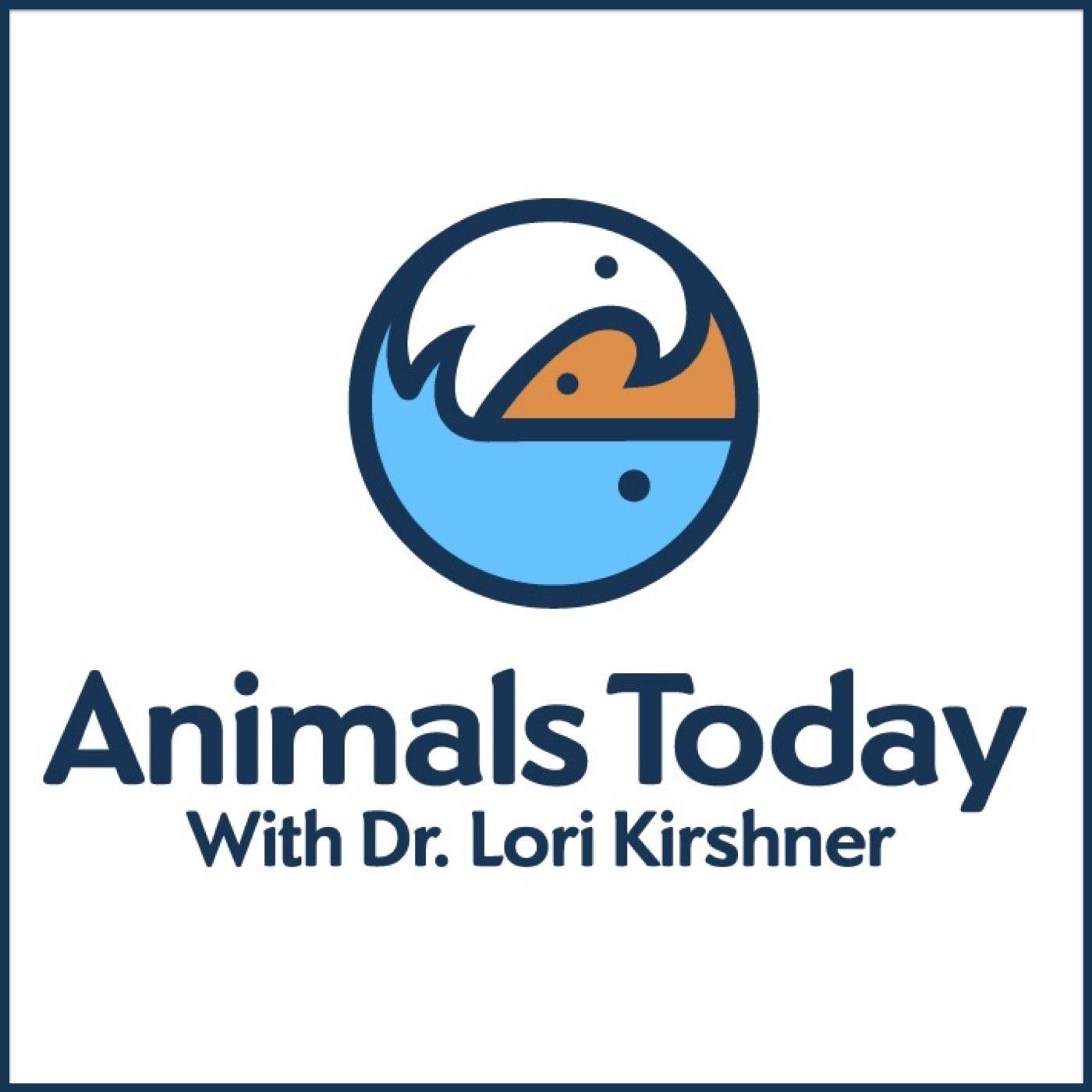
The signature program of the nonprofit, Advancing the Interests of Animals (AIA), is its weekly, one-hour nationally syndicated radio show, Animals Today. Currently in its seventh continuous year, this show provides a worldwide platform where individuals and organizations concerned about the welfare of animals can present their viewpoints and promote their causes. It is a communication hub where listeners learn about a wide variety of animal welfare issues as well as the actions they can take to help animals locally and around the globe. Hosted by Dr. Lori Kirshner and co-host/producer Dr. Peter Spiegel, Animals Today airs in multiple markets with a potential audience of millions of listeners. Listeners worldwide may enjoy live shows via internet streaming, and past shows are archived on the Animals Today website and YouTube for free access anytime. Shows can also be accessed as podcasts on iTunes, on Spreaker, on Tune in radio, and on i heart radio.<br /> <br /> Different than other radio programs whose focus is merely on pets, Animals Today delves deeper by also promoting increased respect, compassion and kindness toward animals in the wild and farmed animals. Via analysis and commentary, it provides the latest thinking and news about animal rights with the goal of educating listeners of all ages about the current status of animals in society and how people can treat them more humanely. The show’s hosts conduct interviews on a wide variety of animal-related topics with news items from around the globe. Programs have focused on such diverse subjects as the dangers wind farms pose to eagles, shark conservation efforts and language and communication research in non-human animals.<br /> <br /> Guests on the show have included celebrities, filmmakers, politicians and government officials, lawyers, authors, scientists, ecologists, food producers, naturalists and activists working in the field. They all share a desire to improve the lives of animals around the world. A few of Animals Today’s noteworthy guests have included Bob Barker, Author Dean Koontz, Actress Tippi Hedren, US Representative Tom Marino, CA Assemblymember Richard Bloom, CT State Representative Fred Camillo, award-winning independent journalist Will Potter, and President, Physicians Committee for Responsible Medicine, Dr. Neal Barnard. Lori and Peter have gone on site to cover The Best Friends National Conference, the FARM animal rights conference, the Born Free USA Primate Sanctuary in Texas, and other events and locations of interest.
Lori leads off this episode exploring the issue of genetic defects in purebred dogs. There are over 500 known genetic defects in purebred dogs, causing health problems, many severe, at a much greater rate than in mixed breed dogs. These genetic defects go along with selective breeding to a “standard” and these standards are established and judged by the American Kennel Club, the AKC. A stated core value of the AKC is to “protect the health and well-being of all dogs,” but Lori points out the absurdity of such a claim, in that the AKC promotes the creation of dogs many of whom are destined to suffer from genetic diseases. And, of course, positioned as central to the breeding industry, the AKC contributes to dog overpopulation, and hence shelter overcrowding and “euthanasia” of adoptable animals.
Yet, the AKC generally is viewed favorably by the public. Lori provides numerous instances to begin countering this notion that the AKC is deserving of praise and admiration. A prime example of this is the French Bulldog, recently named by the AKC as “America’s favorite dog,” which almost always requires birthing by C-section. The heads of the puppies cannot pass through the mothers’ narrow birth canal! Listen in and see if you agree with Lori, and remember, adopt don’t buy! You will also learn some fascinating facts about cheetahs and octopuses along the way!
Then, Peter welcome Lori Marino, PhD., President of The Whale Sanctuary Project. Captive and retired orcas and belugas who are to be liberated need a place to live! The Whale Sanctuary Project is quite far along in creating an expansive ocean sea pen in Nova Scotia, where the whales, who cannot be released into the open ocean because they lack survival skills and families, can retire. This first of its kind project should serve as a model for future humane sanctuaries for formerly captive (and typically captive bred) cetaceans. Dr. Marino explains it all, including telling us how to get involved and help the effort!

Nova Scotia Whale Sanctuary
Peter begins with hot news items including a mass bird killing at Chicago’s McCormick Place, Gavin Newsom signs a fur sale ban in California, a 17’ 2” Burmese python was captured and killed in the Everglades, hero dog in Lebanon saves dumped newborn human, and we say farewell to friend of animals Bob Barker.
Lori then talks about the amazing technology of microchips, and their immense value.
Peter then welcomes a special guest Alison Sawyer, Founder of the rescue Isla Animals, in Mexico. Isla Animals is an established dog and cat rescue, providing free or reduced cost veterinary services, vaccines and medicines, offering free and low cost spay/ neuter clinics, rescuing and rehoming stray animals and offering animals for adoption. Based on Isla Mujeres for more than 20 years, they have been forced to relocate. Isla Animals is building a new home in nearby Cancun, and construction is underway! Peter speaks with its founder, Alison Sawyer about the joys and challenges of doing animal rescue in Mexico. Make sure to check out their GoFundMe page to see update on construction ways you can help get it completed. It is very exciting because with this larger, custom built clinic, they will be able to provide even more services! Isla Animals relies on all of us to do their vital work and, and rest assured that donations go a long way under its direction. Also, all of the proceeds of Alison’s book, The Dog Lady of Mexico go to the non-profit.
We conclude with a fact-filled discussion with Molly Armus, former staff attorney at Alley Cat Allies, who offers useful tips on making harsh winters a bit easier on community cats.
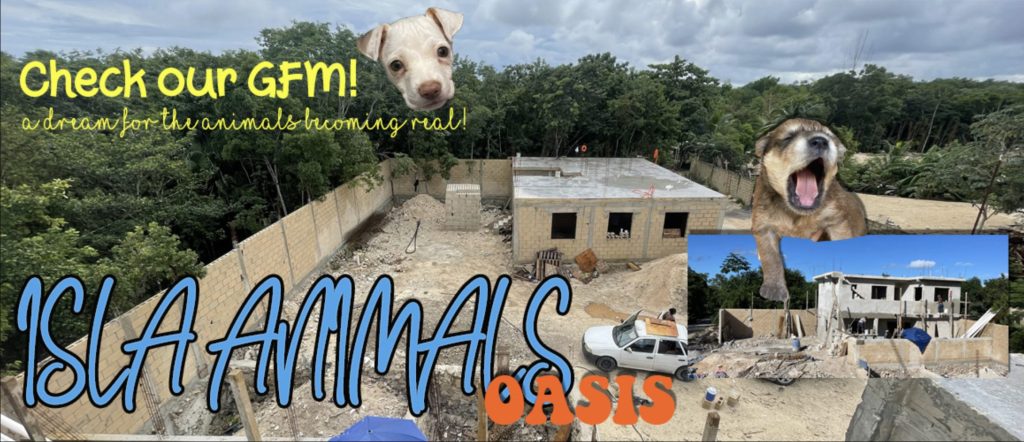
Progress on the new clinic – Isla Animals

McCormick Place is lethal to migrating birds
Peter begins with the iconic Paul Watson, who continues to fight for animals and the seas. Now leading the Captain Paul Watson Foundation, his new book is titled, Hitman for the Kindness Club – High Seas Escapades and Heroic Adventures of an Eco-Activist. Paul discusses the roots of his activism, his role in virtually crushing the seal pelt market, Sea Shepherd’s direct work protecting whales from Japanese commercial whalers in the Southern Ocean as depicted on Whale Wars, and much more. Watson frankly discusses how Sea Shepherd (which, of course, he founded and led for decades) ultimately turned on him. The result is the Captain Paul Watson Foundation, which is worthy of support. Peter thoroughly enjoyed Paul’s book, in which his voice as a confident and wise man of action comes through. Says Watson, “If the oceans die, we die.”
Then, we share their experience with shaving the coat of our long-haired cat, Elton. During the pandemic lockdowns, we were compelled to take on new tasks and learn new skills. We are proud of Elton for his patience and cooperation, and a bit proud of our efforts, too!
To conclude, Join Lori with “tails” of famous Hollywood dogs including Rin Tin Tin, Toto from The Wizard of Oz (real name, Terry) and Lassie, (real name, Pal), Petey from Our Gang (real name, Pal the Wonder Dog) plus others.


Lori begins with the sad news of the death of Lolita (also known as Tokitae and Toki), an orca who has lived nearly her entire life in the small tank at the Miami Seaquarium. Even though there were discussions and reports about plans to transport her to a seaside sanctuary, Lori was skeptical that was in the cards when she discussed the situation in 2022, which is replayed in this episode. Animals Today listeners probably do not need reminding, but we will take the opportunity to state that cetaceans, being highly intelligent and requiring large open areas of ocean to thrive, do not belong in captivity in marine parks. We encourage people to make their voices heard by not buying tickets to such facilities.

Tokitae captive at Miami Seaquarium
Lori continues with veterinarian Evelyn Mackay from Texas A&M College of Veterinary Medicine, who tells us about the ins and outs of pigs as pets. Pigs are smart, inquisitive, and loyal, they enjoy belly rubs, and some even like to take walks. But even the smallest pet pigs are going to weigh 60 to 80 lbs., so be diligent in your research!
Peter then welcomes Dan Paden Vice President of Evidence Analysis at PETA, to learn about their undercover investigation of Pennsylvania turkey producer, Plainville Farms. Wearing hidden video cameras, PETA’s daring agent gained employment and began working in the facility, quickly obtaining footage demonstrating illegal acts of animal cruelty. This evidence led to several prosecutions and thus far a few guilty pleas. Listen in to how the story unfolds, including the almost unbelievable procedure to round up the birds for transport for slaughter.
Dan also explains that PETA regularly receives animal cruelty reports by concerned individuals and has a dedicated team to handle these calls. We conclude with Dan’s thoughtful reflections on the value of such operations.
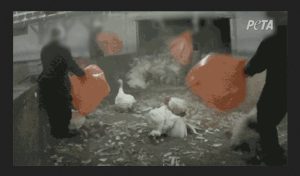
Worker kicking turkey: PETA
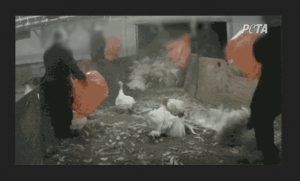
Worker kicking turkey: PETA
Lori leads off this episode exploring the issue of genetic defects in purebred dogs. There are over 500 known genetic defects in purebred dogs, causing health problems, many severe, at a much greater rate than in mixed breed dogs. These genetic defects go along with selective breeding to a “standard” and these standards are established and judged by the American Kennel Club, the AKC. A stated core value of the AKC is to “protect the health and well-being of all dogs,” but Lori points out the absurdity of such a claim, in that the AKC promotes the creation of dogs many of whom are destined to suffer from genetic diseases. And, of course, positioned as central to the breeding industry, the AKC contributes to dog overpopulation, and hence shelter overcrowding and “euthanasia” of adoptable animals.
Yet, the AKC generally is viewed favorably by the public. Lori provides numerous instances to begin countering this notion that the AKC is deserving of praise and admiration. A prime example of this is the French Bulldog, recently named by the AKC as “America’s favorite dog,” which almost always requires birthing by C-section. The heads of the puppies cannot pass through the mothers’ narrow birth canal! Listen in and see if you agree with Lori, and remember, adopt don’t buy!
Then, Peter welcomes author Michelle Nijhuis to learn about her extraordinary book, Beloved Beasts: Fighting for Life in an Age of Extinction. Garnering multiple awards, including the 2021 Rachel Carson Award from the Sierra Club, Nijhuis traces the history of the modern conservation movement, emphasizing the big ideas and big personalities who drove it forward. Peter found it rich with wonderful stories and detail, portraying the complexities, contradictions, frustrations, and victories as the thinking about and the practice of conservation matured. Anyone who cares about animals or the environment, as well as those who enjoy history, should take a good look at this one!

French Bulldog: animalbreeds.com
We dive into a topic every pet owner should consider: What happens to your pets if you’re no longer around to care for them? Join Peter as he sits down with Attorney Ilene McCauley to discuss the intricacies of future planning for our cherished pets. A passionate animal enthusiast, McCauley applies her expertise to assist families in preparing for unexpected circumstances. She shares compelling real-life scenarios and tangible steps you can take right now. If you haven’t set up provisions like a pet trust, it’s time to take action! For more about Ilene and her practice based in Arizona, visit www.ilmlaw.net.
Following that, Dr. Douglas Kunz, the Medical Director of VCA Desert Animal Hospital, enlightens us on the do’s and don’ts when picking toys and treats for dogs. He emphasizes avoiding hard chew toys due to the risk of dental fractures and advises against pig’s ears and bully sticks due to potential E. coli contamination. Listen in for more invaluable tips from Dr. Kunz.
Lastly, we have a fun quiz segment! Are you aware that two US states have the Grizzly bear as their official animal? Or that New Mexico’s state bird is the roadrunner? Test your knowledge with Peter and the ever-enthusiastic Lori as they take us on a journey through the official animals of the US states.
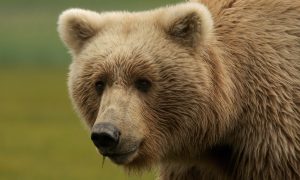
Lori begins the show with worrisome events surrounding the ever-expanding offshore wind farm industry and its probable detrimental effect on whales. The recent alarming increase of the deaths of whales, mostly humpbacks, along the eastern shores of the US coincided with increased construction of wind farms and windf arm activity. There are many ways offshore wind farms can harm whales as outlined by the group Whale and Dolphin Conservation, an authority Lori trusts, and which is a strong advocate for whale protection. Lori explains that a conflict has developed between wind farms and whales. On one side is the powerful green energy industry, bolstered by government edicts, biased agencies and the promise of huge profits for industry. On the other side are the conservationists, the advocates for whales who hold that each whale life ended due to human interference is a tragedy. For now, the power lies with wind farm expansion, but Lori provides some hopeful words of encouragement and ideas for making our voices heard.
Then is a discussion about rabies, sparked by a story of an elderly man who recently died from the disease, which he evidently contracted from a bat. He refused treatment after the exposure, which would have been lifesaving. Any mammal can harbor rabies, with the most common affected animals being raccoons, skunks, bats and foxes. Public health measures to address rabies in dogs started in the 10940s and consisted of widespread vaccinations. Consequently, cases of rabies in dogs in the US are extremely rare. A common misconception about rabid animals is that they can be identified by observing their appearance and behavior but generally, one cannot tell if a given animal has rabies without testing. One important fact to remember is that often, the bite from a bat is so small that it will not leave evident marks on the skin. So, if one awakes, for instance, and observes a bat in the bedroom, he or she must act as if a bite has occurred, which means seeking medical care right away. And that care will include rabies post exposure prophylaxis, a dose of human rabies immune globulin and then 3 doses of the rabies vaccine. This treatment is highly effective in preventing the disease from taking hold and killing the victim, which otherwise occurs 99.9% of the time in untreated cases.
We cap off our episode with a fascinating look at some of nature’s most amazing adaptations. From the Alaskan wood frog’s freeze-thaw survival technique to the deadly venom of the stonefish, prepare to be astounded by Mother Nature’s creativity. Stay tuned as Peter wraps up with international animal news, including Britain’s innovative method to save drowning frogs and Sydney’s clever tactic to manage pesky seabirds.
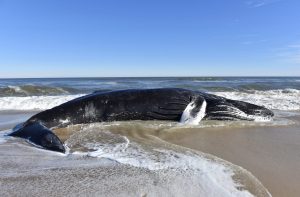
This episode of Animals Today dives deep into the world of mosquitoes and their impact on our world. Did you know August 20th was World Mosquito Day? We discuss the history of these little pests, particularly their notorious connection to diseases like malaria. Discover how Sir Ronald Ross changed the game in 1897 by unveiling the link between mosquitoes and Malaria – a discovery that later earned him the Nobel Prize.
However, our journey doesn’t end there. We venture into the realm of DDT, a controversial insecticide that took center stage during WW2. Its extensive use and subsequent ban have sparked debates lasting decades. Discover the role Rachel Carson’s “Silent Spring” played in challenging the safety of DDT, and how it paved the way for the birth of the modern environmental movement. Dr. Jane Orient, a noted physician, throws light on the DDT ban, criticizing its basis and highlighting its effectiveness in public health.
We then explore recent research on the secrets of peaceful cat and dog coexistence and the potential risks of raw meat diets for our furry friends.
After, Lori sits down with Dr. Robert Reed, the esteemed Medical Director at VCA Veterinary Hospital in sunny Rancho Mirage, California. They dive into the world of bee and wasp stings, revealing the hidden dangers our four-legged friends face. Imagine a simple sting leading to swelling, pain, and fiery redness. But in severe instances, the aftermath can escalate to chilling episodes of vomiting, shakes, facial swelling, and, in worst-case scenarios, anaphylaxis. Think your dog’s been stung? Don’t play the guessing game. Lori and Dr. Reed emphasize the importance of zooming to your vet, because with stings, predictability is not a luxury.
Wrap up with a test of your animal acumen: do you know what is studied in helminthology? How about the age-old question – what on earth happened to Speedy Gonzales? Tune in to join the fun, expand your knowledge, and satisfy that insatiable curiosity!

Rachel Carson
Peter begins the show welcoming Patrick Battuello to discuss the work of his organization, Horseracing Wrongs, in exposing the many cruelties thrust upon horses in the racing industry. Dedicated to ending the cruel and deadly horse racing industry in the United States, Horseracing Wrongs was the first and continues to be the only organization to systematically document all horse injuries and deaths related to racing. Thus, Horseracing Wrongs is the go-to source for facts and stats on horse racing, whether related to thoroughbred or trotter racing.
Battuello explains the nature of the cruelty in and around racing, arguing convincingly that there is no path to reform the industry; the cruelty cannot be removed from the activity. He cites the near complete demise of dog racing in the US and explains how horse racing is undergoing the same path toward oblivion. As an example, the remaining tracks in New York State rely on subsidies derived from on-site slot machine revenues to stay solvent. There is legislation to remove the special status these “racinos” now enjoy, which if passed would make them economically doomed. Another ominous factor for the industry is that it is less popular with younger patrons who have many other gambling and entertainment options.
If you care about horses, you cannot support the racing industry. Battuello makes this conclusion undeniable.
Lori continues with the story of the five activists who, in 2017, entered Circle Four Farms in Utah, intent on documenting animal abuse at Smithfield Foods huge pig facility housed there. But not only was extremely graphic video obtained, but the men also rescued 2 nearly dead piglets, which was not part of the plan. Ultimately, each of them, members of the organization Direct Action Everywhere, was charged with multiple counts, and three agreed to plea deals. The activists who went to trial, Wayne Hsiung and Paul Darwin Picklesimer, ultimately were acquitted in October 2022 of the multiple charges of theft and burglary. Lori goes on to ask the question of if and when it is permissible or desirable to break the law when helping, protecting or rescuing animals, and shares her ideas on this.
We conclude with amazing facts about medicinal leeches and a pop quiz about the adorable koala. And if you thought they were a type of bear, well, pay attention!

Photo: Horseracing Wrongs

Photo: Horseracing Wrongs
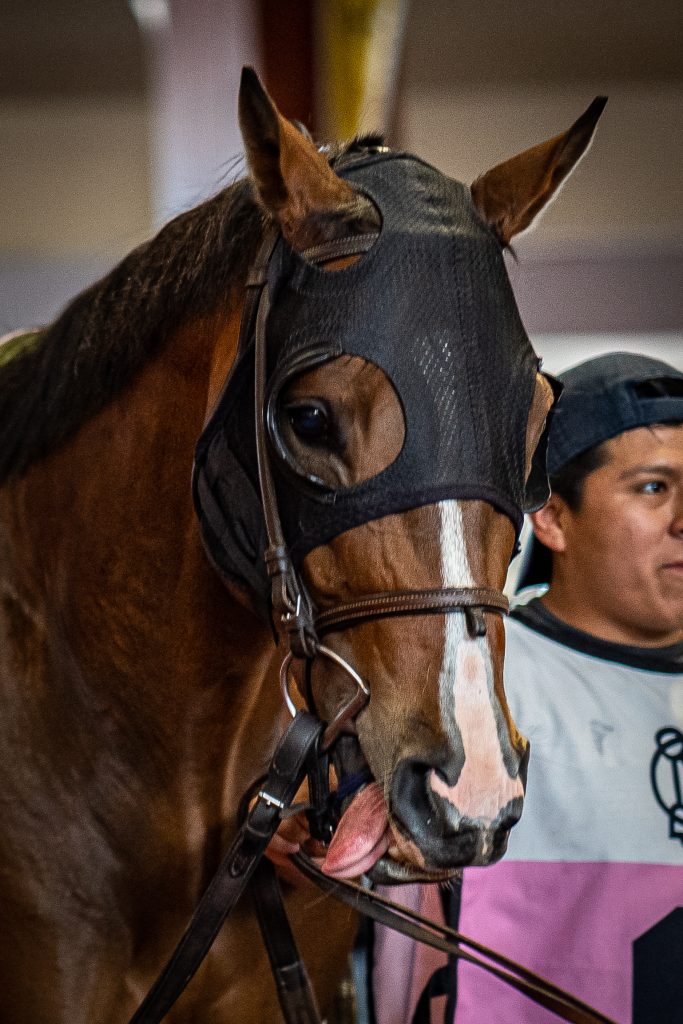
Photo: Horseracing Wrongs
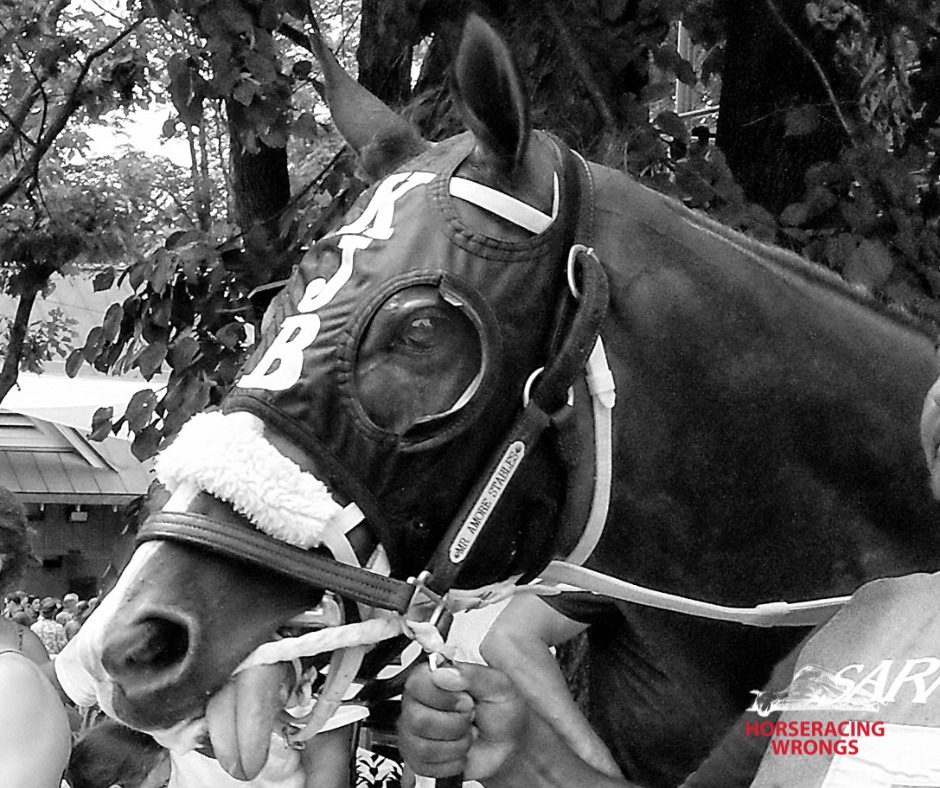
Photo: Horseracing Wrongs
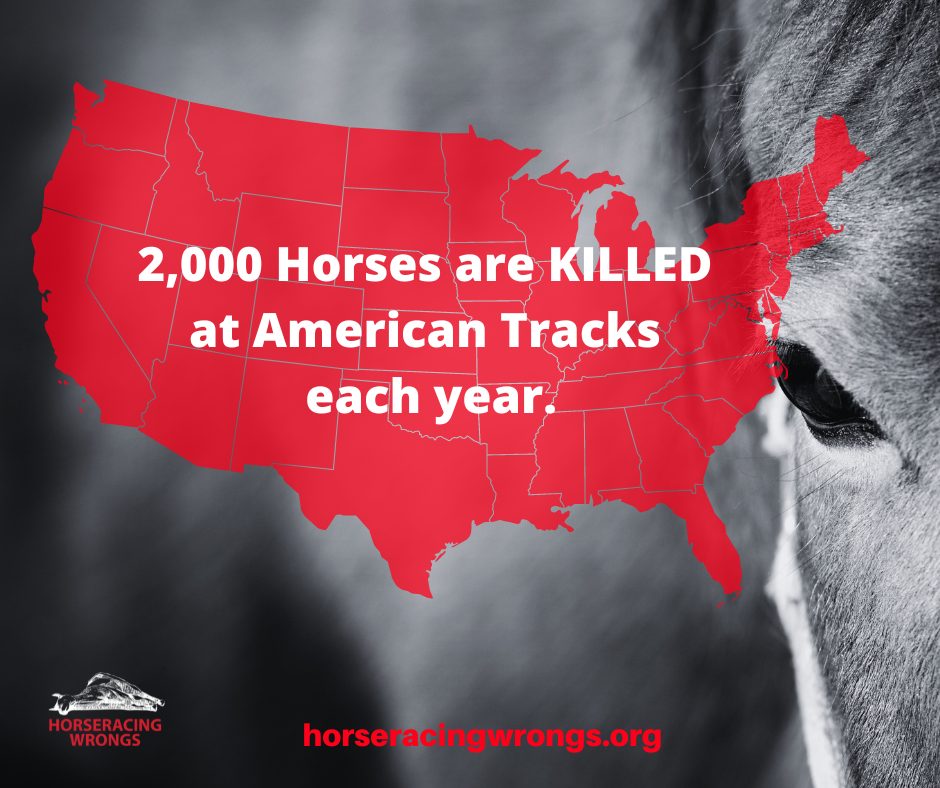
Image: Horseracing Wrongs
Lori begins the show by taking on the still controversial topic of laws and regulations aimed at specific dog breeds, generally referred to as breed specific legislation. There are hundreds of such laws and regulations on the books across the US, which regulate or ban certain dog breeds. Breed specific legislation (BSL) typically targets pit bull type dogs. Those in favor of BSL say it’s necessary to ensure the public’s safety and argue that such legislation protects citizens from vicious and dangerous dogs.
Lori goes on to explain how the assumptions inherent in these types of laws are faulty and discriminatory and outlines the negative consequences that flow from them. A primary problem with breed specific bans or restrictions is that they rely upon the visual appearance and physical traits of a dog to designate them as a certain breed. But numerous studies have shown that one can’t reliably determine the breed or mix of breeds of a dog based upon the visual appearances. Only DNA testing is able to accurately determine the genetic makeup of a dog.
Also, the laws do not take into account the actual behavior of individual dogs. And there is new research showing that the dog’s breed is not a good predictor of the dog’s behavior. It is the experiences of the dog, the environmental factors and the training that are most responsible for the individual characteristics of a dog.
Moreover, we now know that legislation that restricts dogs based on appearance does not reduce dog bites or dog attacks in communities where the laws are in effect. And of course, the existence of these very laws, however misguided and ineffective, reinforce the beliefs that certain dog breeds are just too risky to be around, because they are inherently dangerous.
As a consequence, more of these dogs populate shelters, they are euthanized at high rates, and they become less frequently adopted by the public at large. They are stigmatized and the taint is pervasive. And the downstream effects of stigmatizing dogs (pit bulls especially) are broad, including restrictions placed upon renters by landlords, regulations and limitations placed by homeowner’s associations, limitations on homeowners’ insurability, and so on.
In certain restrictive jurisdictions, one might even be forced to relinquish or give away one’s dog.
So, experts now agree that breed specific legislation and similar policies that restrict dogs based on appearance do not reduce dog bites in communities or enhance public safety. And finally, there is a gradual but slow-moving trend to easing some of the laws and restrictions related to breed discrimination, as the science is more clear than ever against any rationale for restricting or banning dogs based on their appearance.
Lori calls for revocation of laws and regulations against dogs based on breeds, and emphasizes that if the goal is to reduce dog bites and dog attacks in our communities, perhaps funds and resources would be best used on education and on regulation that targets irresponsible dog owners, dog breeders and animal abusers.
Then Peter welcomes Lori Kalef Director of Programs at SPCA International to speak about China’s Yulin dog meat festival and the successful rescue of 21 dogs from certain death. This long running annual event attracts many international visitors, during which an estimated 10,000 dogs are slaughtered and consumed. US based China Rescue Dogs, Partnering with SPCA international coordinated the effort, with vital assistance of rescue groups and dedicated animals lovers in China and stateside to give a few of the lucky dogs what they all deserve: and safe, happy life as our treasured companions.
Kalef details the logistical challenges that were met, the teamwork and coordination employed by a small army of volunteers, organizations, and financial supporters. SPCA International funded the freedom airline flight with a $50,000 Shelter Support grant to China Rescue Dogs. Despite public outcry, the controversial festival continues its horrific practices of torture. Kalef expects this small group of saved dogs will continue to bring greater attention to China’s awful practice, ultimately helping to bring about its end.
To conclude, there are many colorful and descriptive names designating a group of a particular type of animal. You could call a group of geese a gaggle, a bunch of kangaroos a mob, but how about some porcupines?? Test yourself and have fun!
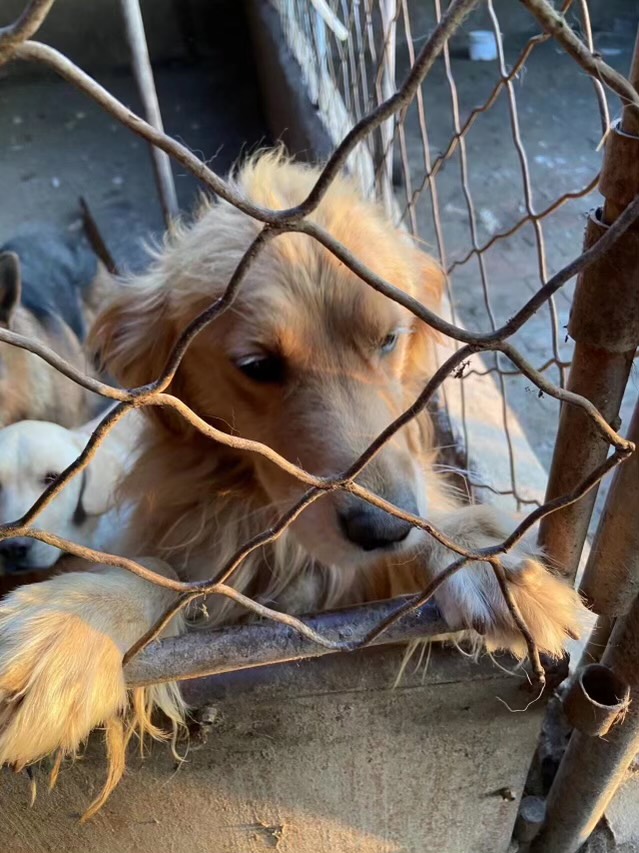
Photo: SPCAI
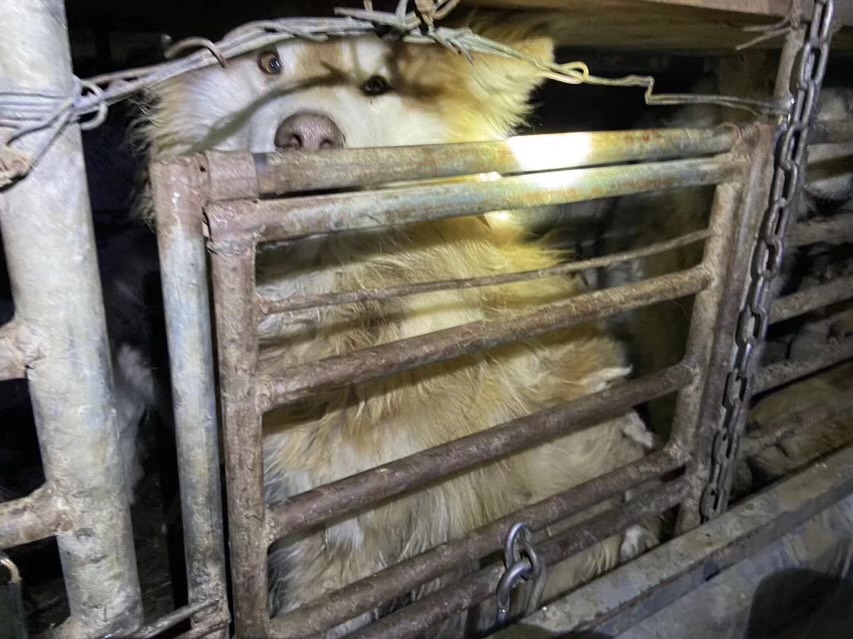
Photo: SPCAI

Photo: SPCAI
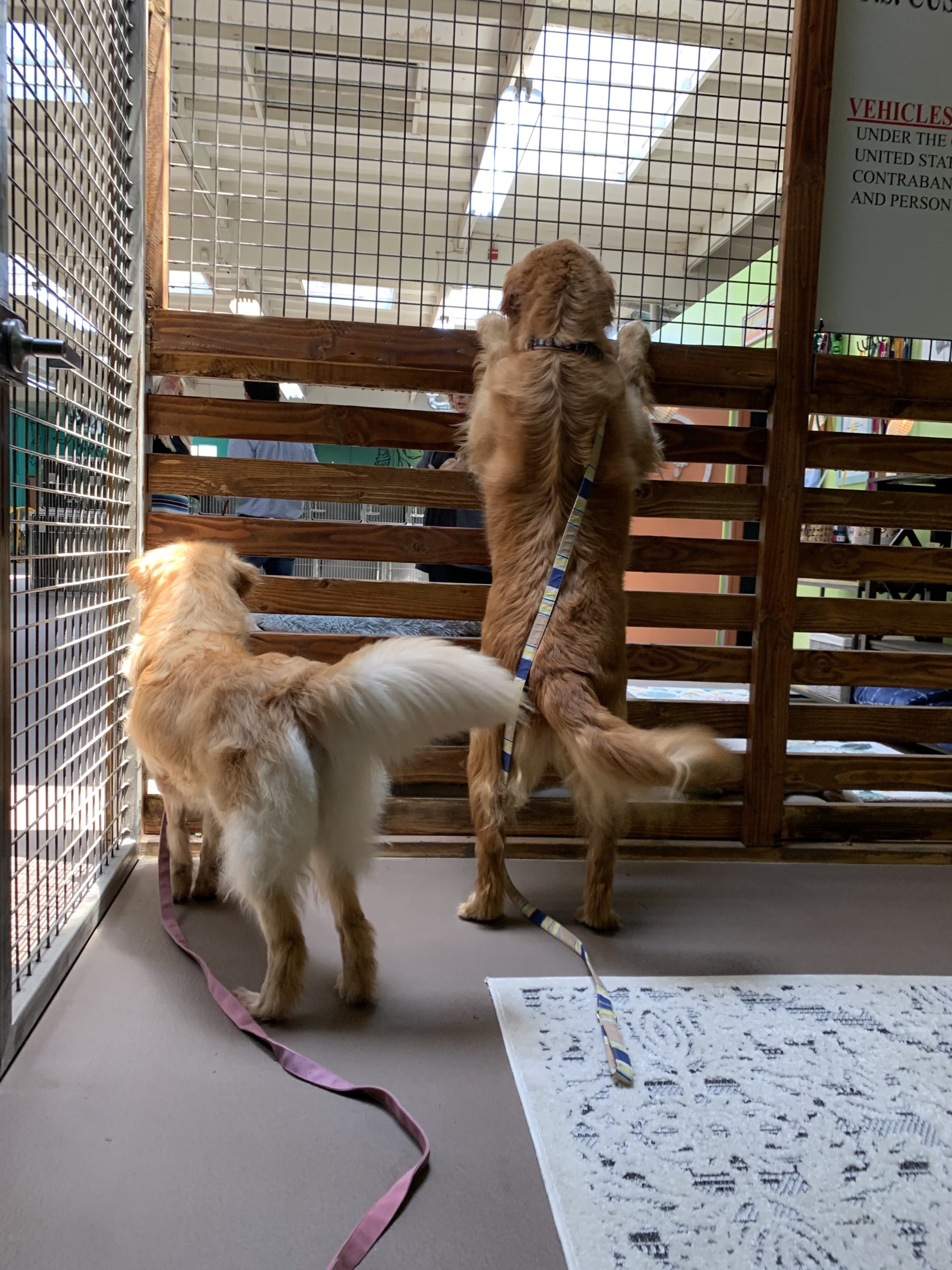
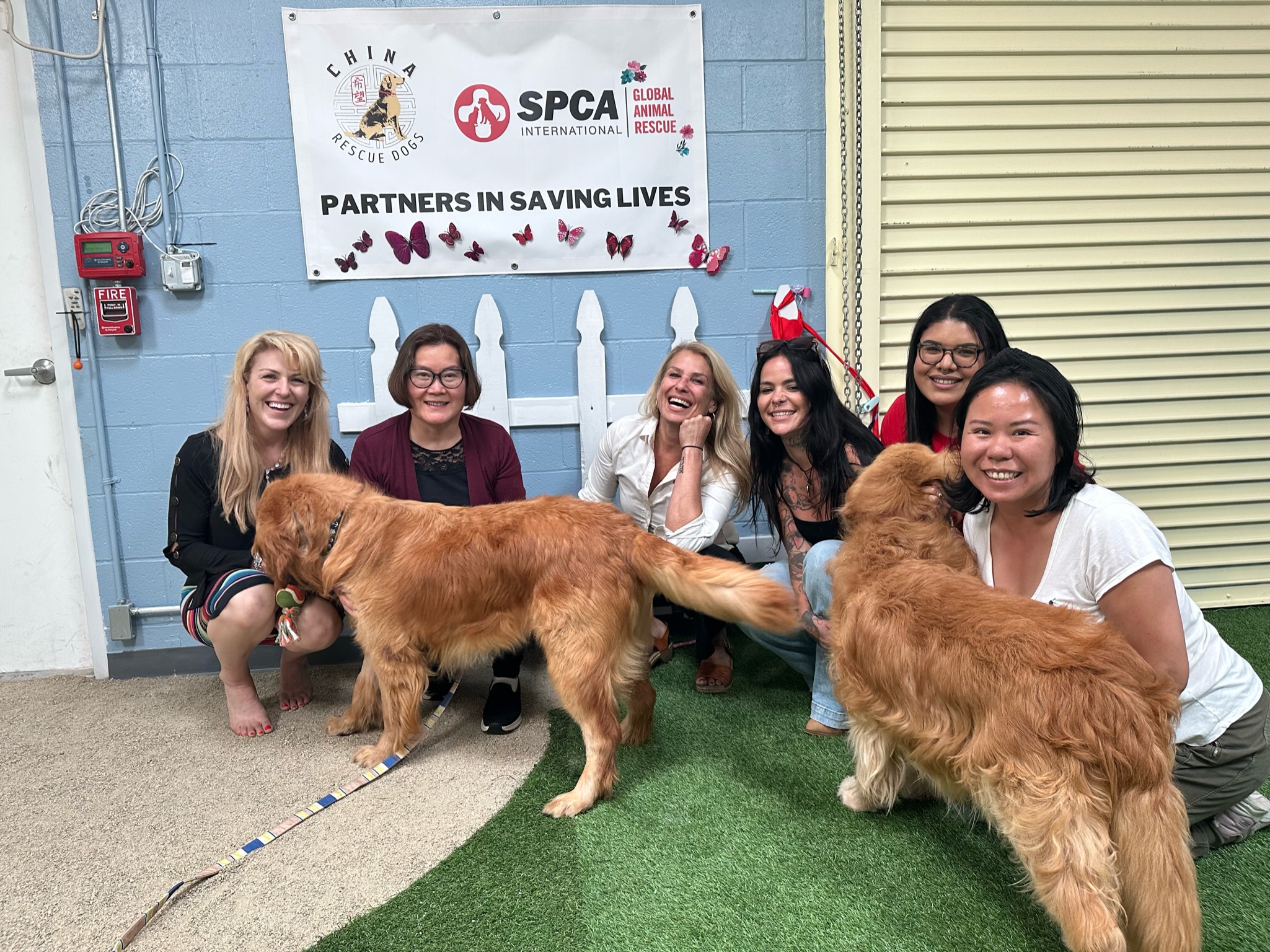
Photo: SPCAI